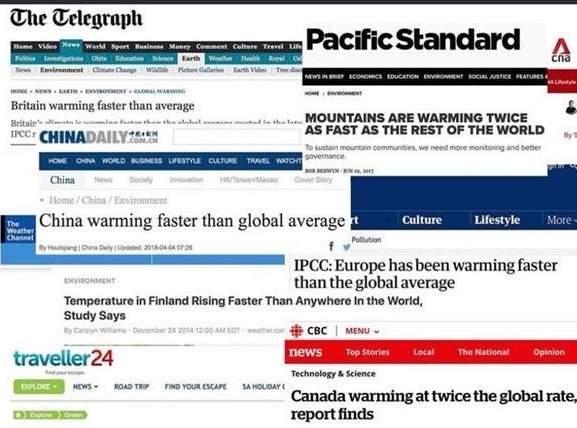
IPCC refutes climate change hysteria
Prime Minister Trudeau justifies his carbon tax saying empirical evidence shows that as a result of man-made climate change storms, floods, heat waves and rising sea levels are all quickly getting worse.
Ontario Premier Doug Ford’s reply to a reporter if he thought climate change played a role in recent flooding was, “I’m a strong believer in that."
The best data available published by the Intergovernmental Panel on Climate Change (IPCC) and NASA in the last few years proves this is little more than alarmist exaggeration.
The IPCC 5th Assessment Report found in 2013:
“No robust trends in annual numbers of tropical storms, hurricanes and major hurricanes counts have been identified over the past 100 years in the North Atlantic basin.”
Their recent 2018 “Special Report on Global Warming of 1.5°C” confirmed their 2013 findings:
“Numerous studies towards and beyond AR5 have reported a decreasing trend in the global number of tropical cyclones and/or the globally accumulated cyclonic energy… There is consequently low confidence in the larger number of studies reporting increasing trends in the global number of very intense cyclones.”
The “Special Report” concluded there has been no increase in flooding:
“There is low confidence due to limited evidence, however, that anthropogenic climate change has affected the frequency and the magnitude of floods."
Our mainstream media are spreading climate change hysteria in virtually every country in the world by claiming the impossible – that local temperatures are all simultaneously warming at the same time to levels two or more times the global average.
To make matters worse, our courts are avoiding looking at the real science and economics of the pollution from energy production and use.
Of the 28 parties that applied for leave to intervene in the provincial appeals of Trudeau’s carbon policy – 13 in Saskatchewan and 15 in Ontario – I was the only one denied.
I argued the law was unconstitutional because it did not meet its stated objective of putting a price on and substantially reducing pollution and limited carbon with huge exemptions for large emitters and green energy.
Further that the “life cycle” clean fuels policy promised to twin the carbon policy is being delayed implementation until 2023 to 2025, which unfairly prevents better solutions from commercial viability and the opportunity to accomplish the stated goal.
After the hearing on January 15, 2019, Ontario Court of Appeal Justice James C. MacPherson ruled that scientific and policy issues relating to greenhouse gas emissions do not assist the court in determining the legal issue of whether the law is constitutional.
The Court of Appeal allowed the governments and interventions by numerous special interest industry and environmental organizations to introduce evidence on the impact of greenhouse gas emissions in the hearings in mid April, 2019.
The Federal Government’s lawyer used the opportunity to claim carbon pricing was the "least intrusive" and "most cost effective" greenhouse gas emissions reduction tool and it helped stop "carbon leakage," where large industry moves inter-provincially to avoid emission regulations, and that carbon pricing lowering emissions was “proven science”.
The submissions conveniently left out important scientific facts such as the carbon tax has to be many times higher than is proposed to be effective, and the carbon emission exemptions for large emitters and “life cycle” exemptions for green energy, like ethanol, which takes more energy to make than is in it and causes more pollution.
The Federal and Ontario clean fuel and diesel policies increasing ethanol content to fifteen percent of fuels do not deal with “life cycle” impacts like indirect land use change emissions and feedstock sustainability criteria for biofuels/bioliquids/biomass.
A June 2017, Montreal Economic Institute study proved subsidizing electric vehicles an expensive and inefficient way to reduce CO2 emissions. It is only better than fossil fuels when 100 percent of the electricity is made from renewable sources.
The policies of making winners out of corporate cronies and political insiders based on non-science preclude the benefits the many new and emerging clean-tech energy systems would bring.
There’s no real price on most pollution; all we have is a carbon scam.
Greg Vezina, is Chairman, Hydrofuel Inc. and leader of Ontario’s None of the Above Direct Democracy Party.







